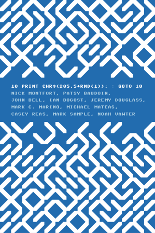_This was my statement for the “Taroko Gorge Remixed” panel yesterday (June 21) at the 2012 ELO conference. The panel was organized by Mark Sample and also featured Scott Rettberg, J. R. Carpenter (who joined us by video chat), Talan Memmott, Eric Snograss, Flourish Klink, and Andrew Plotkin. In attendance and part of the discussion were Leonardo Flores and Sonny Rae Tempest, who did work based on the Taroko Gorge code after the panel was proposed._
It is curious that I was invited to be part of this panel today, for I am the only speaker in this session who has not created and released a remix of Nick Montfort’s “Taroko Gorge.”
Today, however, to remedy this mismatch, to bridge this gap, to traverse this gorge, I am releasing a remix of my poetry generator, “Taroko Gorge.” This new work that I have completed and placed online today is also called “Taroko Gorge.” This remix was created to be an elegant poetry generator, producing a boundless nature poem and inspired by the experience of walking through Taroko Gorge National Park in Taiwan. The code of the program is the same as that of the original, and the text used as strings in the generator is also the same as that of the original. No comments have been added.
So, how can one distinguish this new “Taroko Gorge” from the original poetry generator of the same name? For one thing, I have placed today’s date on the right side of the page, to indicate that _this_ is the remix that was completed today. When citing this work, you must also include the date that you accessed this page to comply with MLA, Chicago Manual of Style, and other bibliographic standards. If you leave the “Taroko Gorge” page open long enough, staring at it with meditative bliss, rapt attention, or monomaniacal trembling, you should include a date range rather than a single date in your bibliographic entry.
But enough of the temporal dimension. In addition to including a date, the new version of “Taroko Gorge” includes the names of all known vandals, those who have replaced my own lyrical words and phrases with ones associated with various other individual visions, ranging from the idiosyncratic to the downright perverse. These appear on the right-hand side – stricken out. Since it is not proper to condemn people without evidence – unless we put them aboard a plane and take them to another country – I have also included links to the offending Web pages.
This remix of “Taroko Gorge” asserts something very simple: that the rebirth of the author comes at the expense of the death of other authors. Something simple, about originality, voice, and purity of essence, which has been said in so many ways: Remix = death. Take back the gorge. Don’t tread on me. There’s a bear in the woods. Make it old. I did it my way. Under the page, the code.








